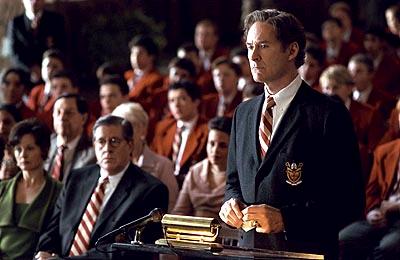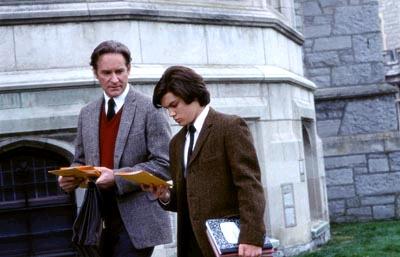

The interaction between a principled teacher and his/her rambunctious student is not a new theme in movies, but The Emperor's Club, based on Ethan Canin's short story The Palace Thief does manage to discover some new nuances. The issue is that while the end of the story may not be what most people expect, the trip there is exactly the same as any other of movies, recent examples being Dead Poets Society and Mr. Holland's Opus. The Emperor's Club takes place in two eras, the present and earlier in the century. William Hundert (Kevin Kline, Orange County, Life as a House) is a Western Civilization professor, who not only teaches his students but wants to instill in them a sense of responsibility.
Hundert believes that success is not important unless one gives back. He wants all his students to embody this altruistic sense, and can be considered stern and even stuffy. Hundert's life changes with the arrival of Sedgewick Bell (Emile Hirsch, The Dangerous Lives of Altar Boys, Wild Iris). Bell is a troublemaker who flaunts any sort of authority, and is lazy and a lover of pranks. He is also the son of an influential Senator (and donor). Hundert recognizes that Bell is smart, and just needs some sort of focus. He happens to run the Mr. Julius Caesar competition, which singles out a top student every year based on a series of tests culminating in a quiz on Roman history before an audience.
Under Hundert's tutelage, Bell begins to change for the better, and to effect a change in Hundert. Then, something happens in Neil Tolkin's (Sticks and Stones, Jury Duty) adaptation to throw Bell and Hundert's beliefs into turmoil. It is this incident that connects the two different times of The Emperor's Club. The importance thing about what happens is how it affects the two, especially Hundert. Hundert has a strict set of beliefs as well as clear ideas of right and wrong, and he does something that clearly violates his ethics. Decent material, but the problem is that it is so familiar.
Director Michael Hoffman (A Midsummer Night's Dream, One Fine Day) is mining familiar character traits and storylines. The Emperor's Club is a decent, moving story made worse by the fact that everybody has seen something like it before. Maybe this is why characters like Elizabeth and James Ellerby come into play. They are minor characters who feel extraneous, as if they shouldn't be included in the film. Elizabeth (Embeth Davidt, 13 Ghosts, Bridget Jones's Diary) is a married platonic friend, and Ellerby (Rob Morrow, Maze, Labor Pains) is a professor Hundert brought to the school. Yes, they do have roles, but it feels more like padding than anything else. In the end, The Emperor's Club barely manages to squeak out the emotional impact that these films usually have and strive for.